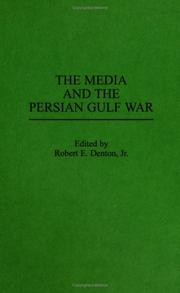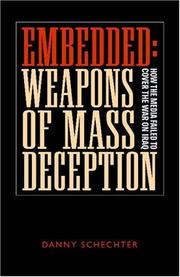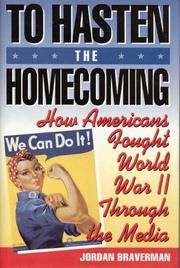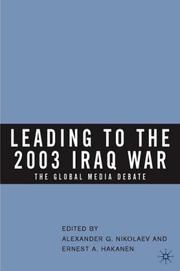| Listing 1 - 10 of 94 | << page >> |
Sort by
|
Multi
ISBN: 9065504230 Year: 1995 Publisher: Hilversum Verloren
Abstract | Keywords | Export | Availability | Bookmark
 Loading...
Loading...Choose an application
- Reference Manager
- EndNote
- RefWorks (Direct export to RefWorks)
World War, 1939-1945 --- Netherlands --- Mass media and the war --- History --- Mass media and the war.

ISBN: 0275942325 Year: 1993 Publisher: Westport (Conn.) : Praeger,
Abstract | Keywords | Export | Availability | Bookmark
 Loading...
Loading...Choose an application
- Reference Manager
- EndNote
- RefWorks (Direct export to RefWorks)
Persian Gulf War, 1991 --- Journalists. --- Mass media and the war.
Book
ISBN: 9782343148120 Year: 2018 Publisher: Paris : L'Harmattan,
Abstract | Keywords | Export | Availability | Bookmark
 Loading...
Loading...Choose an application
- Reference Manager
- EndNote
- RefWorks (Direct export to RefWorks)
L'objet de ce livre est de décrire le système médiatique français et sa manière de traiter les conflits libyen et syrien à l'aune du "modèle de propagande" mis sur pied par Edward Hermann et Noam Chomsky dans les années 1980, dans leur ouvrage de référence Manufacturing Consent. Ainsi, à rebours de l'image d'Epinal de médias consciencieux, impartiaux et garants de la vérité que les journalistes aiment renvoyer, cet essai tente de démontrer comment un large consensus structure la présentation qui est faite de l'actualité en matière internationale. De la prédominance des partis pris et de l'instrumentalisation généralisée des informations - entre autres - se dégage une nouvelle manière de voir le discours médiatique et de comprendre sa nature propagandiste.
Mass media --- Libya --- Syria --- History --- Mass media and the war
Book
ISBN: 9782800418209 Year: 2022 Publisher: Bruxelles Editions de l'Université de Bruxelles
Abstract | Keywords | Export | Availability | Bookmark
 Loading...
Loading...Choose an application
- Reference Manager
- EndNote
- RefWorks (Direct export to RefWorks)
Alors que le retour de la guerre en Europe au XXI e siècle démontre le caractère désormais central de la communication dans le processus de mobilisation des opinions publiques et des moyens de l'affrontement, la guerre coloniale en Indochine au milieu du siècle précédent est le moment d’apprentissage d’une arme alors nouvelle : l’information. En contexte démocratique d'autonomie des journaux, l'armée française apprend non plus à taire les événements mais à saturer l’espace médiatique de son propre point de vue. Pour cela, elle développe des usages de coopération avec les médias et leurs journalistes, afin de les abreuver de faits et de moyens. Elle se fait incontournable sinon indispensable. Elle invente aussi ses propres moyens de production de photographies et de films qu’elle propose gratuitement aux journaux et aux actualités cinématographiques en France et à l’étranger. Ses propres reporters, plus en guerre que de guerre, véritables soldats de l’information, deviennent les yeux de l’opinion, tant leurs images captées au plus proche des combats sont diffusées par les médias, sans que ceux-ci disent à leurs publics l’origine institutionnelle et donc orientée de ces documents souvent remarquables. En Indochine se construit alors une culture partagée par les militaires et les journalistes, une expérience commune de coopération sur les terrains de guerre et à travers les supports médiatiques. Ainsi, mieux que la propagande, l’information journalistique devient une arme.
Indochinese War, 1946-1954 --- War correspondents --- Press coverage --- Journalism, Military --- Journalists --- Mass media and the war --- Press coverage. --- Journalism, Military. --- Journalists. --- Mass media and the war.

ISBN: 1591021731 9781591021735 Year: 2003 Publisher: Amherst Prometheus Books
Abstract | Keywords | Export | Availability | Bookmark
 Loading...
Loading...Choose an application
- Reference Manager
- EndNote
- RefWorks (Direct export to RefWorks)
Iraq War, 2003-2011 --- Mass media and the war. --- Mass media and war

ISBN: 1568330472 Year: 1996 Publisher: Lanham (Md.) : Madison books,
Abstract | Keywords | Export | Availability | Bookmark
 Loading...
Loading...Choose an application
- Reference Manager
- EndNote
- RefWorks (Direct export to RefWorks)
Popular culture --- Public opinion --- World War, 1939-1945 --- Mass media and the war. --- Public opinion.
Book
ISBN: 9539646235 Year: 2000 Publisher: Zagreb : Centre for transition and civil society research,
Abstract | Keywords | Export | Availability | Bookmark
 Loading...
Loading...Choose an application
- Reference Manager
- EndNote
- RefWorks (Direct export to RefWorks)
Yugoslav War, 1991-1995 --- Mass media and the war. --- Press coverage.


ISBN: 1403971137 1281363669 1349532800 1403977313 9786611363666 Year: 2006 Publisher: New York Palgrave Macmillan
Abstract | Keywords | Export | Availability | Bookmark
 Loading...
Loading...Choose an application
- Reference Manager
- EndNote
- RefWorks (Direct export to RefWorks)
Arguably, each country's media represented its opinions for or against the 2003 Iraq war, giving the viewer insight into the nation's stance on the war, and their political reasoning. By concentrating on the pre-war coverage, this group of scholars engages in a more open discussion of the issues than would take place during wartime, and uncovers the implications for each country's position on international concerns.
Iraq War, 2003 --- -Iraq War, 2003-2011 --- Mass media and the war.
Book
ISBN: 0857723529 0755623940 0857730959 1280512393 9786613595539 0857721038 9780857721037 9780857730954 9781848858640 1848858647 9781780764634 1780764634 9780857723529 9780755623945 9781280512391 Year: 2012 Publisher: London New York I.B. Tauris
Abstract | Keywords | Export | Availability | Bookmark
 Loading...
Loading...Choose an application
- Reference Manager
- EndNote
- RefWorks (Direct export to RefWorks)
"International media coverage in the 1960s and early 1970s represented the Biafran War, in which the state of Biafra attempted to secede from the Nigerian Federation, as a grand humanitarian disaster, characterised by sustained conflict, starvation and genocide. Using interviews and newly-released archival material, Michael Gould questions this depiction, examining the role of foreign parties in the conflict and the impact of propaganda upon its international reception both during and after the war. Envisaged initially by both sides as a short conflict, the war confounded all expectations, stretching on for four years. It was a 'brother's war', one which divided families, and was characterised overwhelmingly by both sides' reluctance to enter into hostilities. This book seeks to answer some of the most fundamental questions surrounding the conflict, including how this avoidable conflict came about, why the war became so drawn-out and how the leadership of the opposing Generals Ojukwu, who led the Biafran revolt and Gowon, who was President of the Nigerian Federation, defined the conflict."--Bloomsbury Publishing.
Nigeria --- Nigeria, Eastern --- History --- Causes. --- Mass media and the war. --- History.
Book
ISBN: 9780765617767 9780765617774 Year: 2009 Publisher: Armonk Sharpe
Abstract | Keywords | Export | Availability | Bookmark
 Loading...
Loading...Choose an application
- Reference Manager
- EndNote
- RefWorks (Direct export to RefWorks)
World War, 1939-1945 --- Mass media and the war --- Press coverage --- Propaganda
| Listing 1 - 10 of 94 | << page >> |
Sort by
|

 Search
Search Feedback
Feedback About UniCat
About UniCat  Help
Help News
News